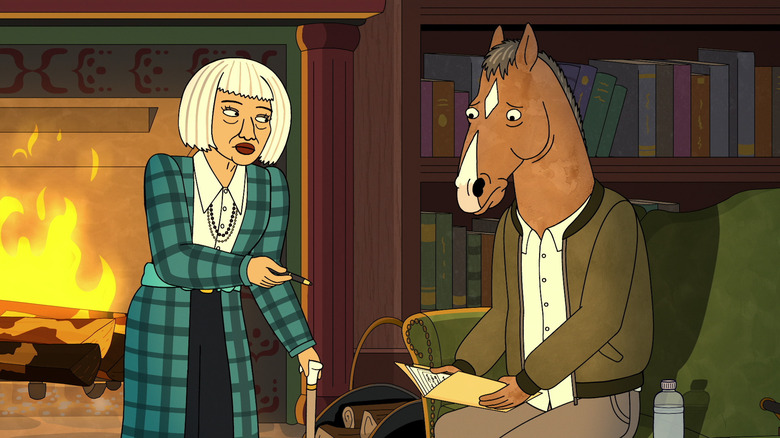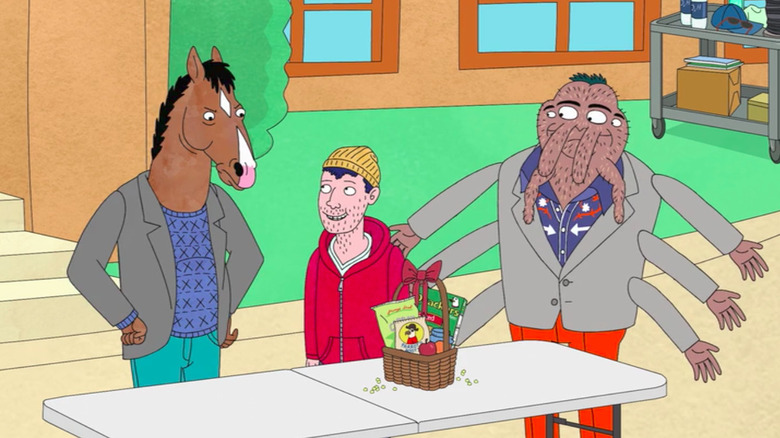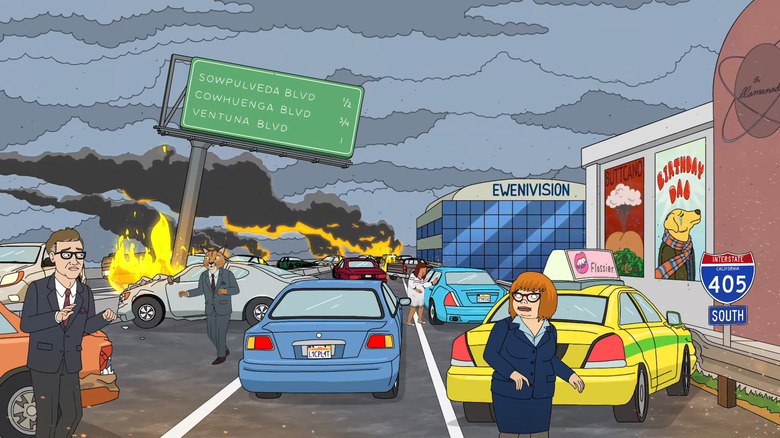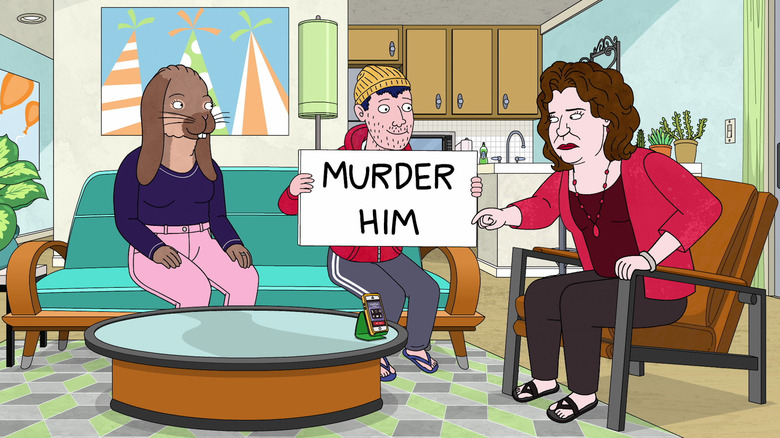Why A Directors Guild Deal Won't End Hollywood's Writers Strike This Time
Film and Television writers across the nation have downed their tools — pens, laptops, even Post-it notes. The Writers Guild of America's previous contract with the AMPTP (Alliance of Motion Picture and Television Producers, a body representing hundreds of movie and TV studios including heavy-hitters like Disney, Netflix, and Warner Bros. Discovery) expired at midnight on May 1. Due to disputes over pay, the size of writers rooms, the use of artificial intelligence, and other issues, negotiations for a new deal failed to resolve in time, and the writers have been on strike since May 2.
If you don't watch late-night shows like "The Tonight Show" or "Saturday Night Live" (which have gone dark in the absence of writing teams), you might not have been personally affected by the writers strike yet. For moviegoers and TV viewers the impact will come later: in shortened seasons, botched storylines, and bad films shot using bare bones scripts. But studios are feeling the pain right now, with productions suspended and others forced to shut down filming as WGA picket lines form outside.
The latter tactic has been particularly effective thanks to solidarity from the other film industry unions — specifically, IATSE (the International Alliance of Theatrical Stage Employees) and the International Brotherhood of Teamsters (representing drivers, security staff, and various other employees). Though those unions aren't currently on strike, their members do have the right to refuse to cross another union's picket line if it stands between them and the set. Many are doing so, which gives the WGA strike the impact of multiple unions striking together.
Now, the Director's Guild of America has struck a tentative deal with the AMPTP that seems designed to bring an end to the writers strike as well. But this time around, that strategy may not work.
What's the deal with the DGA deal?
The existing contract between the Director's Guild of America and the AMPTP is set to expire on June 30, so a tentative new deal has been reached with a few weeks to spare. The guild's membership still needs to vote in favor of the deal in order to ratify it, and not everyone seems happy about the way negotiations were handled. "The Machine" director Peter Atencio commented, "Would be nice if my union had at least attempted to communicate with members on a potential deal with the AMPTP rather than us reading about it in the press first."
Nonetheless, it's unlikely that the DGA membership will vote to reject the deal. Unlike the WGA, which is on its eighth strike since the 1950s, the DGA has only gone on strike once in its 87-year history. That was in 1987, and the strike lasted a grand total of three hours and five minutes for DGA East, and just five minutes for DGA West.
The exact terms of the latest deal aren't publicly available yet, but according to the DGA's press release (via Deadline) it includes wage increases of 5 percent in the first year, 4 percent in the second, and 3.5 percent in the third (roughly in line with inflation), a 76 percent increase in foreign streaming residuals, and, for directors of episodic TV, a guaranteed additional day of shooting for one-hour programs. But perhaps the most significant part of the deal, given that AI has been a sticking point in WGA negotiations, is a "groundbreaking agreement confirming that AI is not a person and that generative AI cannot replace the duties performed by members."
Will a DGA deal weaken the writers strike?
WGA members and hyphenate DGA members (those who also belong to the WGA) have good reason to take a dim view of this deal, however fair it might look. In an email sent to members ahead of the tentative deal being announced, the WGA reiterated the popular view that the DGA reaching a deal in 2008 effectively brought about the end of the last writers strike, leaving the WGA with fewer gains than they could have gotten otherwise. "The AMPTP set a strategy in motion designed to be a repeat of 2007/08," the WGA wrote in the email, continuing:
"Divide and conquer. Hold off a deal with the DGA until after the WGA contract expiration date so that in the event of a writers' strike the AMPTP could force a DGA pattern on the WGA. Even better if they could also sew up a deal with SAG-AFTRA. They would then claim that the writers were being unreasonable."
"One Day at a Time" writer Mike Royce even predicted the timed announcement of the deal back in May, right down to the use of the word "historic" in the press release and in headlines. But because the WGA has been anticipating AMPTP using the same playbook as it did in 2008, that strategy probably won't be effective this time around. Both the WGA and SAG-AFTRA (the union that represents actors, whose contract negotiations are set to begin on June 7) have stated their intention to resist "pattern bargaining" — attempts to shape their new contracts according to the DGA's deal. "Our own bargaining positions remain the same as they were on May 1, 2023," the WGA wrote in a public statement. "The AMPTP will not be able to negotiate a deal for writers with anyone but us."
All eyes on SAG-AFTRA
Assuming that DGA members vote to ratify their own deal, the next point of focus will be the upcoming SAG-AFTRA negotiations. An actors strike in combination with the writers strike could trigger a devastatingly expensive shut down and force AMPTP's hand. And SAG-AFTRA is far less strike-shy than the DGA; actors have deployed lengthy strike action several times in the past, including a six-week industry-wide strike in 1960 led by none other than President Ronald Reagan (then only president of SAG, not the whole country).
Studios have been attempting to continue production on many shows and movies, using a combination of scripts written before the strike and quiet forms of scabbing (i.e. actors improvising lines, or directors doing rewrites). Similar strategies were deployed during the last writers strike, which is why so many terrible movies were released circa 2008/09. Speaking to Time Out London, James Bond actor Daniel Craig recalled:
"On 'Quantum [of Solace]', we were f****d. We had the bare bones of a script and then there was a writers strike and there was nothing we could do [...] There was me trying to rewrite scenes — and a writer I am not.'"
However, while a studio that doesn't particularly care about quality can force a production to limp on without writers, it's a lot more difficult to shoot a movie or TV show without actors.
What really unifies SAG-AFTRA and the WGA this time around is the issue of AI replacing or undermining them. While studios may have agreed to keep AI out of directors' jobs on the basis that current AI tech isn't really aimed at replacing directors anyway, the same can't be said for writers or actors. Disney has already made strides in that direction by, for example, using an AI-generated voice clone of James Earl Jones for Darth Vader's lines in "Obi-Wan Kenobi." Meanwhile, large language models (or, as WGA East negotiator Greg Iwinski describes them, "plagiarism machines") are being trained to "write" from a data set of existing screenplays.
Generating AI scripts (however dull and unusable they might be) is relatively cheap but replacing actors with AI is expensive, so the AMPTP may relent on the AI issue in the upcoming SAG-AFTRA negotiations. If a new deal can't be reached before June 30, however, we could see Hollywood completely grind to a halt.



